10 动词时态专项复习课件 2024中考二轮复习(知识讲解+真题解析+能力拔高)
文档属性
| 名称 | 10 动词时态专项复习课件 2024中考二轮复习(知识讲解+真题解析+能力拔高) |  | |
| 格式 | pptx | ||
| 文件大小 | 31.8MB | ||
| 资源类型 | 试卷 | ||
| 版本资源 | 通用版 | ||
| 科目 | 英语 | ||
| 更新时间 | 2024-05-23 15:52:11 | ||
图片预览

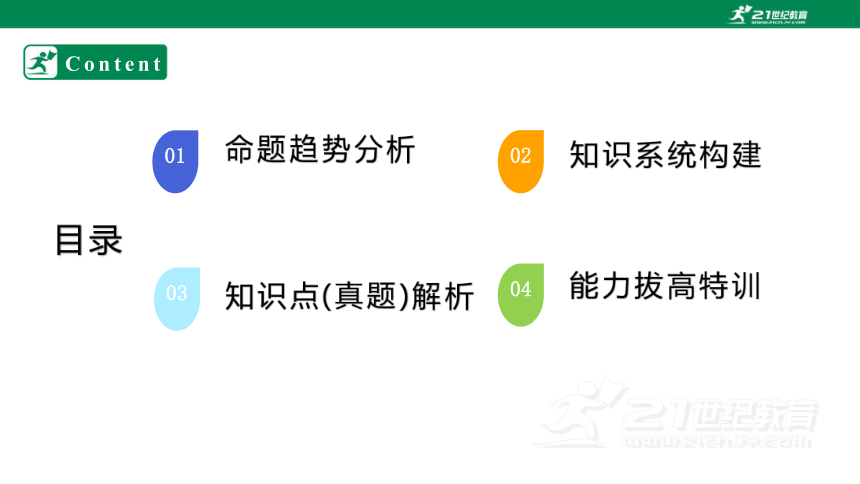

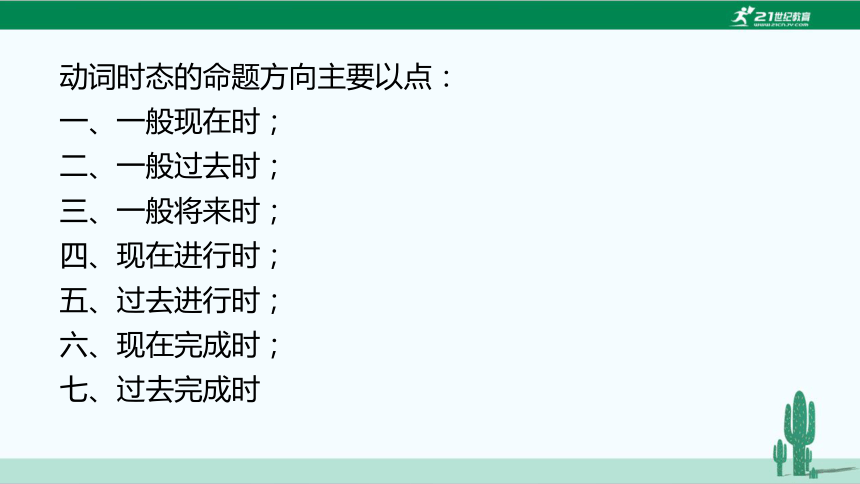
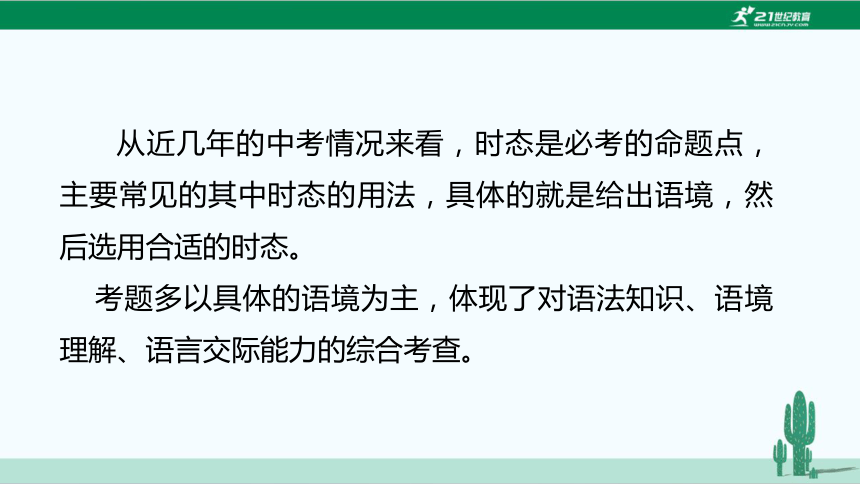

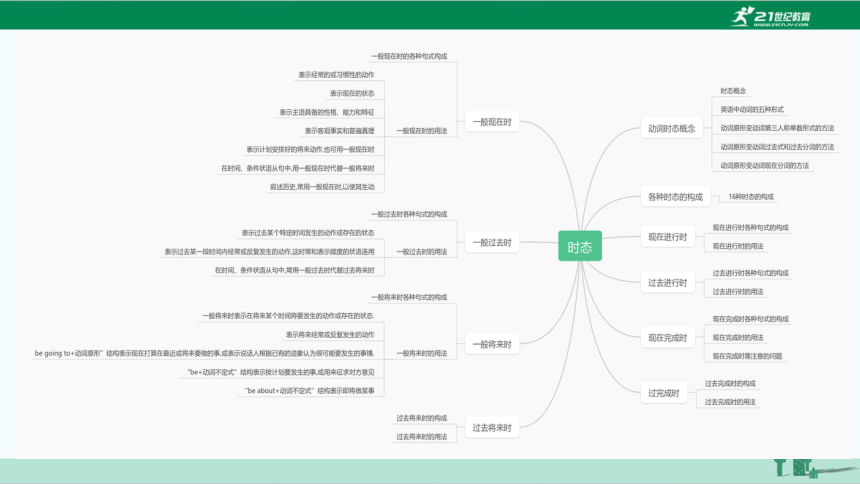

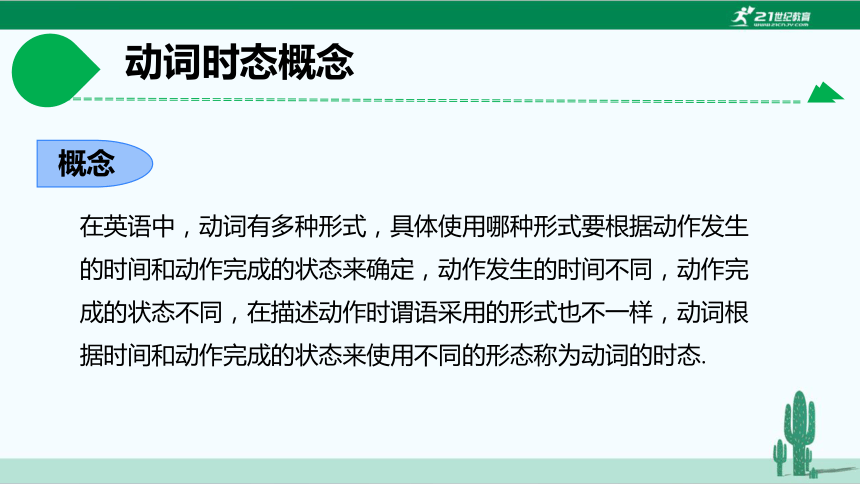
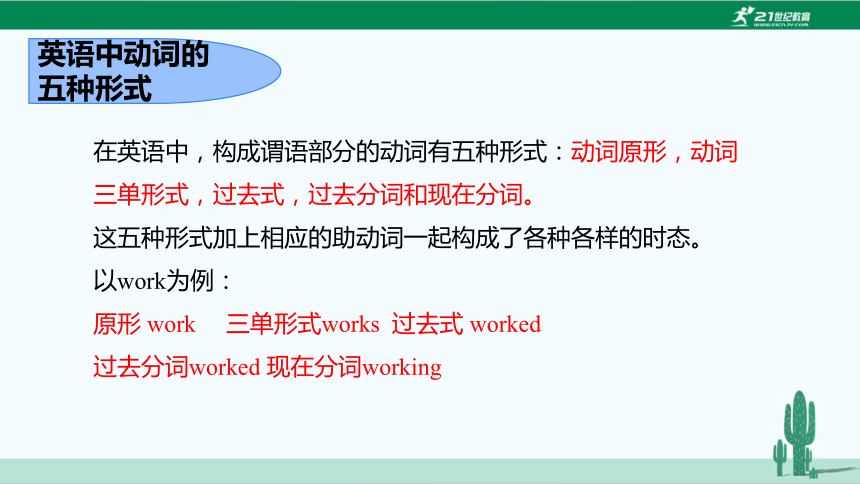
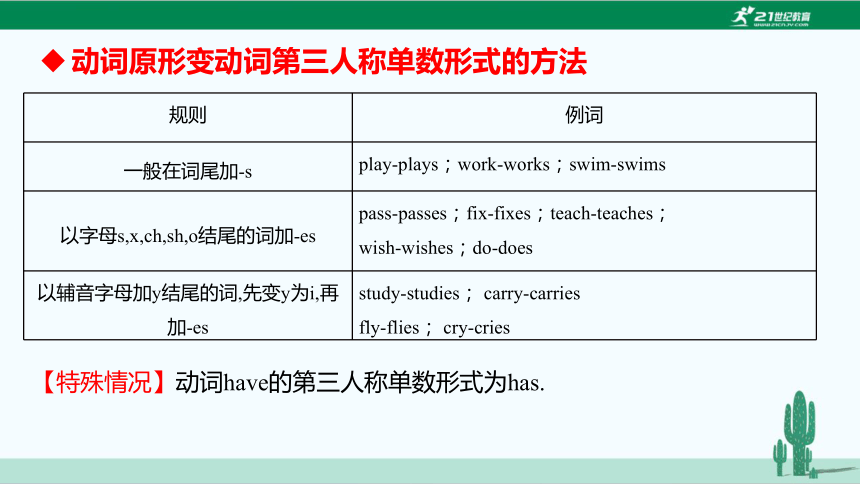
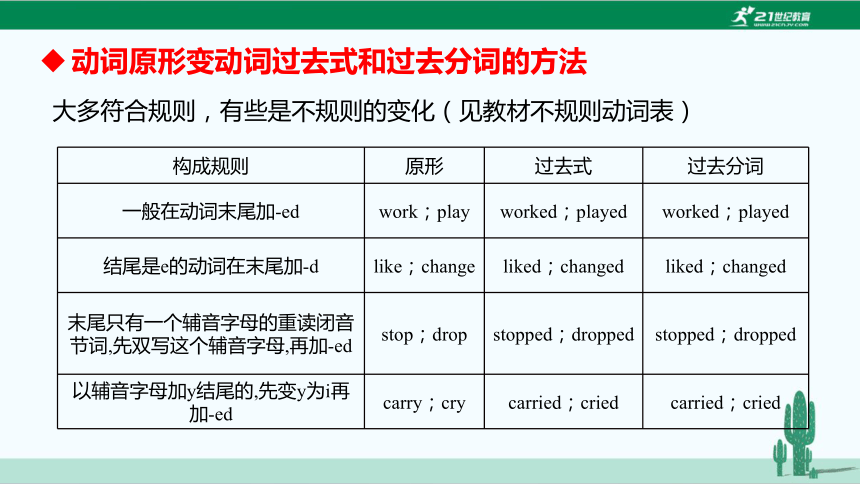
文档简介
(共73张PPT)
10 动词时态专项复习
2024年中考二轮复习
Content
命题趋势分析
01
知识系统构建
02
知识点(真题)解析
03
能力拔高特训
04
目录
命题趋势分析
动词时态的命题方向主要以点:
一、一般现在时;
二、一般过去时;
三、一般将来时;
四、现在进行时;
五、过去进行时;
六、现在完成时;
七、过去完成时
从近几年的中考情况来看,时态是必考的命题点,主要常见的其中时态的用法,具体的就是给出语境,然后选用合适的时态。
考题多以具体的语境为主,体现了对语法知识、语境理解、语言交际能力的综合考查。
知识系统构建
知识点(真题)
解析
在英语中,动词有多种形式,具体使用哪种形式要根据动作发生的时间和动作完成的状态来确定,动作发生的时间不同,动作完成的状态不同,在描述动作时谓语采用的形式也不一样,动词根据时间和动作完成的状态来使用不同的形态称为动词的时态.
概念
动词时态概念
在英语中,构成谓语部分的动词有五种形式:动词原形,动词三单形式,过去式,过去分词和现在分词。
这五种形式加上相应的助动词一起构成了各种各样的时态。
以work为例:
原形 work 三单形式works 过去式 worked
过去分词worked 现在分词working
英语中动词的五种形式
动词原形变动词第三人称单数形式的方法
规则 例词
一般在词尾加-s play-plays;work-works;swim-swims
以字母s,x,ch,sh,o结尾的词加-es pass-passes;fix-fixes;teach-teaches;
wish-wishes;do-does
以辅音字母加y结尾的词,先变y为i,再加-es study-studies; carry-carries
fly-flies; cry-cries
【特殊情况】动词have的第三人称单数形式为has.
大多符合规则,有些是不规则的变化(见教材不规则动词表)
动词原形变动词过去式和过去分词的方法
构成规则 原形 过去式 过去分词
一般在动词末尾加-ed work;play worked;played worked;played
结尾是e的动词在末尾加-d like;change liked;changed liked;changed
末尾只有一个辅音字母的重读闭音节词,先双写这个辅音字母,再加-ed stop;drop stopped;dropped stopped;dropped
以辅音字母加y结尾的,先变y为i再加-ed carry;cry carried;cried carried;cried
动词原形变动词现在分词的方法
规则 动词原形
一般在动词原形末尾加-ing stay-staying;listen-listening;do-doing
以不发音的字母e结尾的,先去掉e,再加-ing make-making;take-taking;give-giving
以一个辅音字母结尾的重读闭音节词,先双写这个辅音字母,再加-ing put-putting;sit-sitting;run-running
以ie结尾的动词,先去掉e,把i变为y,再加-ing lie-lying;die-dying
以re结尾的动词,先去掉e,再加-ing prepare-preparing;interfere-interfering;bore-boring
以er结尾的动词,如果是重读音节结尾,先双写r,再加-ing;如果不是重读音节结尾,就直接加-ing prefer-preferring
英语的时态从时间上划分,可以分为:现在时、过去时、将来时和过去将来时;
从动作进行的状态上划分,每一类又可以分为:一般式、进行式、完成式和完成进行式.
这样,英语动词合起来共有16种时态.现以动词work为例,将16种时态形式列表如下:
各种时态的构成
现在时 过去时 将来时 过去将来时
一般式 work/works worked shall/will+work should/would+work
进行式 am/are/is+working was/were+working shall/will+be+working should/would+be+working
完成式 has/have+worked had+worked shall/will+have+worked should/would+have+worked
完成进行式 have/has+been+ working had+been+working shall/will+have+been+ working should/would+have+been+ working
这些时态中常用的有:一般现在时、一般过去时、一般将来时、现在进行时、过去进行时、现在完成时、过去完成时以及过去将来时8种.
各种时态的用法
一般现在时
一般现在时的各种句式构成
否定式 疑问式 否定疑问式 简单回答
I do not work. Do you work Do you not work Yes,I do.No,I don't.
You do not work. Do you work Do you not work Yes,I do.No,I don't.
He/She/It does not work. Does he/she/itwork Does he/she/it notwork Yes,he/she/it does.No,he/she/it doesn't.
We do not work. Do we work Do we not work Yes,you do.No,you don't.
You do not work. Do you work Do you not work Yes,we do. No,we don't.
Theydo not work. Do they work Do they not work Yes,they do. No,they don't.
(1)表示经常的或习惯性的动作
常与often, always, sometimes, every day, on Sundays/Mondays等表示频度的时间状语连用.
My father often gets up early in the morning.我父亲早晨经常早起.
He has breakfast at 7:00 every morning.他每天早晨七点吃早饭.
(2)表示现在的状态
My father is at work. He is very busy.我父亲在工作,他很忙.
The boy is twelve.这个男孩儿12岁.
一般现在时的用法
(3)表示主语具备的性格、能力和特征
I like to listen to music.我喜欢听音乐.
They speak English very well.他们英语说得非常好.
(4)表示客观事实和普遍真理
Two plus two is four.2加2等于4.
The sun rises in the east and sets in the west.太阳从东方升起,从西方落下.
(5)表示计划安排好的将来动作,也可用一般现在时,只限于: go, come, leave, start, begin, arrive, be等动词
The plane takes off at 11 a.m.飞机上午11点起飞.
He comes back tonight.他今晚回来.
(6)在时间、条件状语从句中,用一般现在时代替一般将来时
Turn off the lights before you leave.走前关灯.
If it doesn't rain tomorrow, we'll go to the park.如果明天不下雨,我们就去公园
(7)叙述历史,常用一般现在时,以使其生动
Jeanne is sitting in the park. Mathilde walks towards her, and she stops and speaks to Jeanne.珍妮在公园里坐着.玛蒂尔德向她走来,停下来和珍妮谈话.
一般过去时
一般过去时各种句式的构成(以动词work为例)
否定式 疑问式 否定疑问式 简单回答
I did not work. Did you work Did you not work Yes,I did.No,I didn't.
You did not work. Did you work Did you not work Yes,I did.No,I didn't.
He/She/ It did not work. Did he/she/it work Did he/she/it notwork Yes,he/she/it did.No,he/she/it didn't.
We did not work. Did we work Did we not work Yes,you did.No,you didn't.
You did not work. Did you work Did you not work Yes,we did.No,we didn't.
They did not work. Did they work Did they not work Yes,they did.No,they didn't.
1.表示过去某个特定时间发生的动作或存在的状态
这时常与yesterday, last week, a moment ago, in 1949等表示过去时间的状语连用.
I had two eggs and a glass of milk.早饭吃了两个鸡蛋和一杯牛奶.
My sister passed her examination because she studied very hard.我妹妹通过了考试,因为她学习非常努力.
一般过去时的用法
2.表示过去某一段时间内经常或反复发生的动作,这时常和表示频度的状语连用
Last term we often did experiments.上学期我们经常做试验.
He always went to work by bus.他过去总是乘车去上班.
【知识拓展】used to do的否定式和疑问式有两种构成法.
(1)借助did,即:didn't use to do (2)不用did,即:usedn't to do
He didn't use to do it, did he 他过去不经常这么做,是吗
Did you use to play football 你过去经常踢足球吗
She usedn't to make those mistakes.她以前并不经常出那些错的.
Used you to play football 你过去经常踢足球吗
3.在时间、条件状语从句中,常用一般过去时代替过去将来时
He said he would not go if it rained.他说如果天下雨就不去了.
They told us that they would not leave until she came back.他们告诉我们直到她回来他们才会离开.
一般将来时的否定式、疑问式、否定疑问句式和简单回答形式,以study为例:
一般将来时
一般将来时各种句式的构成
否定式 疑问式 否定疑问句式 简单回答
I shall/will not study. Shall I study Shall I not study (Shan't I study ) Yes,you will.No,you won't.
You will not study. Will you not study Will you study (Won't you study ) Yes,I shall/will.No,I shan't/won't.
He/She/It will notstudy. Will he/she/it not study Will he/she/it study (Won't he/she/it study ) Yes,he/she/it will.No,he/she/it won't.
We shall/will notstudy. Shall we study Shall we not study (Shan'twe study ) Yes,you will.No,you won't.
You will not study Will you study Will you not study (Won't you study ) Yes,we shall/will.No,we shan't/won't.
They will not study. Will they study Will they not study (Won't they study ) Yes,they will.No,they won't.
shall用于主语为第一人称 I(we); will可用于各人称。
美式英语中,不论什么人称和数,一律用will+动词原形.在口语中,will常缩写为“'ll”与主语连写在一起.
如:I'll, you'll, he'll和she'll we'll, they'll; shall not 常缩写为shan't, will not常缩写为won't.
在疑问中,主语为第一人称(I和We)时,常用助动词shall.
1.一般将来时表示在将来某个时间将要发生的动作或存在的状态.常与表示将来的时间状语如tomorrow, next week/month/year等连用
I'll come to pick you up at 6:00 on Wednesday evening.我星期三晚上6点来接您.
My daughter will be twenty years old next year.我女儿明年就20岁了.
2.表示将来经常或反复发生的动作
I'll come and see you every Sunday next year.明年我将每个星期天来看你.
We shall come and work in this factory every year.我们将每年到这个工厂来劳动.
一般将来时的用法
3.“be going to+动词原形”结构表示现在打算在最近或将来要做的事,或表示说话人根据已有的迹象认为很可能要发生的事情.如:
We are going to have a new subject this year.今年我们将学一门新学科.
It's going to rain this afternoon.今天下午天要下雨.
I'm not going to write letters.我不打算写信.
4.“be+动词不定式”结构表示按计划要发生的事,或用来征求对方意见
Where are we to stay tonight 今晚我们在哪儿过夜
What is to do 怎么办
5.“be about+动词不定式”结构表示即将做某事
I haven't gone yet, I'm about to.我还没走,正要走呢.
The Sports Meeting is about to start now.运动会即将开始.
【拓展】
有些表示位置转移的动词,如come, go, leave, start, arrive, fly等的现在进行时可表示按计划或安排将要发生的动作,常与表示将来的时间状语连用.
He is leaving for Shanghai tomorrow.他明天动身去上海.
They are arriving tomorrow afternoon.他们明天下午到达.
1.在回答Shall I...问句时,应该说:Yes, please./Please do.或No, please don't./Please don't.不可说:Yes, you shall.或No, you shall not.
2.在回答 Shall we...问句时,应该说:Yes, let's... 或 No, I don't think we shall./No, let's not.
【需注意的几点】
will和be going to的比较
1.will和be going to 都可表示某种意愿但其含义和用法有所不同.
be going to往往表示经过考虑的打算,而will多表示意愿、决心.
We are going to watch the football game.我们打算观看这场足球赛.
I will tell you all about it.我将把全部情况告诉你.
2.will可用于条件从句表示将来的意愿,而be going to用于条件从句,只是表示单纯的将来,试比较
Miss Gao will tell you the answer if you ask her.如果你去问高老师,她会告诉你答案的.
If you are going to attend the meeting, you'd better leave now.如果你要参加会议,最好现在就走.
现在进行时由“am/is/are+动词现在分词”构成.
现在进行时的肯定式、否定式和疑问式及简单回答形式:(以动词work为例)
现在进行时
现在进行时各种句式的构成
肯定式 I am/'m working. He (She,It)is/isn't working. We(You,They) are/'re working.
否定式 I am not/'m not working. He(She,It)is not/isn't working. We(You,They) are not/aren't working.
疑问式 Are you working... Is he(she,it)working... Are you(we,they)working...
简单回答 Yes,you are.No,you aren't.Yes, I am. No,I'm not. Yes,he(she it) is. No,he(she,it)isn't.Yes,we(you,they) are. No,we(you,they) aren't.
1.表示说话时正在进行或发生的动作
这时可以不用时间状语,也可以和now, at present, at the moment等时间状语连用.
What are you reading now 你在读什么
His mother is watching TV at the present.此刻,他的妈妈正在看电视.
2.表示当前一段时期内的活动或现阶段正在进行的动作,常与表示一段时间的状语these days, this week等连用
They are working in a factory these days.他们这几天正在工厂劳动.
More and more people are giving up smoking.越来越多的人在戒烟.
现在进行时的用法
3.现在进行时常与always, continually, constantly, forever等频度副词连用,表示经常、反复发生的动作。
He is always thinking of his work.他总是想着他的工作.
They're forever quarrelling about something.他们老是为某件事争吵不休.(不满)
5.有些动词:如come, go, arrive, begin, start等的现在进行时可表示将要发生的动作,一般跟时间状语,表明动作发生的时间
The train is arriving soon.火车要到了.
Are you going anywhere tomorrow 明天你到哪儿去吗
过去进行时由“was/were+现在分词”构成.
过去进行时的肯定式,否定式和疑问式及简单回答.(以动词work为例)
过去进行时
过去进行时各种句式的构成
肯定式 I(He,She,It)was working. We(You,They)were working.
否定式 I(He,She,It)was not working. We(You,They)were not working.
疑问式 Was (he,she,it)working.. Were we(you,they)working...
简单回答 Yes,you were. No,you were not. Yes,I was. No, I was not.
Yes,he(she,it) was. No, he(she,it) was not.
Yes,you(we,they)were. No,you(we,they) were not.
1.表示过去某一个时刻或某一段时间内正在进行或发生的动作
通常与表示过去的时间状语连用,如:
then, at this/that time, yesterday, at nine, last night等
At 8:00 o'clock yesterday evening I was having dinner with some friends.昨天晚上八点,我在和几位朋友一起吃饭.
The doorbell rang while my mother was cooking the dinner.在妈妈做饭时,门铃响了.
过去进行时的用法
2.表示移动的动词.如:come, start, stay, leave, fly等词的过去进行时,可以表示过去将要发生的动作
He was leaving the following day.他第二天将要离开.
She asked when I was starting.她问我何时动身.
3.过去进行时动词常与always, forever, continually, constantly, frequently等副词连用,强调过去经常性或习惯性动作。
He was forever complaining about something.他老是怨这怨那.
He was constantly asking questions.他老是没完没了地提问题.
一般过去时表示在过去某个时间发生的动作或存在的状态;而过去进行时则表示在过去某个特定时间正在进行的动作.
Mary wrote a letter to her friend last night.玛丽昨晚给她朋友写了封信.(信已写完)
Mary was writing a letter to her friend at 8:00 o'clock last night.
昨晚八点钟玛丽在给她的朋友写信.(信不一定写完,只说明了动作的延续)
It was raining this time yesterday.昨天这个时间在下雨.(动作延续)
It rained yesterday.昨天下过雨.(动作完成)
【一般过去时与过去进行时的用法比较】
现在完成时由“have/has+过去分词”构成.
现在完成时的肯定式、否定式和疑问式及简单回答.(以动词work为例)
现在完成时
现在完成时各种句式的构成
肯定式 I(You) have worked. He(She,It) has worked. We(You,They) have worked.
否定式 I(You) have not/haven't worked.He(She,It) has not/hasn't worked.We(You,They) have not/haven't worked.
疑问式 Have you worked... Has he(she,it) worked... Have we(you,they) worked...
简单回答 Yes,you(I) have. No,you(I) have not/haven't. Yes,he(she,it) has.No, he(she, it) has not/hasn't.Yes,you(we,they) have.No,you(we,they) have not/haven't.
1.表示过去已经开始,持续到现在(也许还会继续进行下去)的动作或状态;
常和表示一段时间的状语,如:today, these days, since, for, this month, now等连用
I have worked at this school for 20 years.我在这所学校工作20年了.
They have lived in Beijing since 1972.他们从1972年以来就住在北京.
2.表示过去发生或已经完成的某一动作对现在造成的影响或结果
She has lost her watch.她把表丢了.
Someone has broken the window.有人把窗户打碎了.
现在完成时的用法
1.现在完成时不能和表示过去的时间状语连用,如yesterday, last week, in 1999,two days ago, just now, when I came in。
2.have(has) been和 have(has)gone的区别
表示“曾到过某地”要用“have(has)been”;表示“已经去某地”要用“have(has) gone”.试比较:
Where has he been 他刚才到哪儿去了 (他已回来)
Where has he gone 他上哪儿去了 (他现在不在这里)
They have been to Beijing.他们到过北京.(现在已不在北京了)
They have gone to Beijing.他们到北京去了.(他们可能在去北京的路上,或者已到北京)
现在完成时需注意的问题
3.现在完成时与一般过去时在意义上的区别
现在完成时表示过去发生的某一动作对现在造成的影响或结果,强调的是现在的情况,而一般过去时只表示过去的动作或状态,和现在不发生关系.试比较:
I have seen him.我已见过他了.(我了解他的情况)
I saw him yesterday.我昨天看到他的.(只说明昨天我看到他,并不涉及现在的情况)
I have been ill for a week.我已病了一周了.(现在还在生病)
I was ill for a week.我病了一周.(过去病了一周)
5.现在完成时与一段时间连用时应注意句中的谓语动词应是延续性动词,非延续性动词在肯定句中不可和一段时间连用,在否定句中非延续性动词可与一段时间连用.
误:I've left this school for eight years.
正:I've been away from this school for eight years.我离开这所学校已经八年了.
I haven't gone to see him for several months.我已经好几个月没去看他了.
过去完成时构成:助动词had+过去分词
所有人称和数都用“had+过去分词”;
其否定式had not 常缩写为hadn't;
过完成时
过去完成时的构成
肯定式 I(You)/He(She,It)/ We(You,They)+had worked.
否定式 I(you)/He(She,It)/We(You,They)+had not/hadn't worked.
疑问式 Had+you/he(she,it)/we(you,they)+worked...
简单回答 Yes,I(you)/he(she,it)/we(you,they)+had
No, I(you)/he(she,it)/we(you,they) +had not/hadn’d
过去完成时的肯定式和疑问式及简单回答形式:
(以动词work为例)
1.表示在过去某一时间之前(也称为“过去的过去”)已经发生或完成的动作.
常与“by/before+过去的时间”构成的短语连用。
How many English songs had you learned by the end of last term 到上学期末,你们学了几首英文歌
By the end of last year, we had planted 10,000 trees.到去年年底,我们一共栽种了1万棵树了.
过去完成时的用法
2.某些表示意愿、意图等的动词,如:think, hope, want, intend, plan, mean等,其过去完成时常表示本来打算做而没有做的事
I had meant to buy, but I brought no money.我本想买,但身上没带钱.
He had intended to speak, but time did not permit.他本想发言,可是时间不允许.
I had thought that they all knew about it.我还以为他们都知道这件事呢.(实际上他们并不知道)
I had hoped that you would come, but you didn't.我本希望你能来,可你没有来.
1.过去将来时构成:
①助动词would+动词原形,助动词would常简写为“’d”.
例如:“I'd" “you'd” “he'd”等;
would not 常简写为”wouldn't"
②过去将来时还可以用“was(were)+going to+动词原形”来表示
过去将来时
过去将来时的构成
1.表示从过去某一时间看将要发生的动作或存在的状态.
I wondered why he wouldn't go with us.我想知道,他为什么不和我们一起去.
They asked how they would go to Paris.他们问他们将怎么去巴黎.
2.过去将来时也可用“was/were going to+动词原形”构成,表示曾经打算或准备要做的动作
I thought it was going to rain soon.我认为很快就会下雨.
He said he was not going to be there.他说他不准备在那儿.
过去将来时的用法
3.过去将来时还可用“was/were+动词不定式”或“was/were about+动词不定式”结构,表示某种过去将来的意义
She said that they were to see their English teacher next week.她说下个星期她们要去看她们的英语老师.
We were to finish the work in three days.我们打算三天内完成任务.
4.过去将来时常用来表示过去的习惯性动作,这时往往有一个时间状语陪衬
Every evening she would teach us to read and write.每天晚上她都来教我们读写.
1.(2023·河北·统考中考真题)I ________ ice skating this Sunday. Do you want to come
A.go B.went C.was going D.will go
【答案】D
【详解】句意:这个星期天我要去滑冰。你想来吗?
考查时态。根据“Do you want to come”可知动作还未发生,用一般将来时will do。故选D。
真题再现
2.(2023·河北·统考中考真题)This book must be great. My sister ________ it five times.
A.reads B.has read C.is reading D.was reading
【答案】B
【详解】句意:这本书一定很棒。我妹妹读了五遍。
考查时态。根据“My sister...it five times.”可知,强调动作已经完成的次数,用现在完成时,故选B。
3.(2023·河北·统考中考真题)Some students ________ Taiji over there. Let’s go and join them.
A.play B.played C.are playing D.were playing
【答案】C
【详解】句意:有些学生在那边打太极。让我们去加入他们吧。
考查时态。根据“Let’s go and join them.”可知他们正在打太极,可以去加入他们,故时态用现在进行时(am/is/are doing)。故选C。
4.(2023·湖北武汉·统考中考真题)—The car will not start. What can I do
—Don’t worry. Tom and I ________ it a push.
A.give B.gave C.have given D.will give
【答案】D
【详解】句意:——汽车发动不了。我怎么办呢?——别担心。汤姆和我会推它的。
考查动词时态。根据“The car will not start. What can I do ”可知“汤姆和我会去推车”,应用一般将来时,其结构为will do。故选D。
5.(2023·湖北武汉·统考中考真题)Jessica ________ every night before her Chinese test and got good results.
A.studies B.studied C.has studied D.will study
【答案】B
【详解】句意:杰西卡在语文考试前每天晚上都学习,并取得了好成绩。
考查动词时态。根据and以及got可知,空处与got是并列关系,所以空处填动词过去式,故选B。
6.(2023·湖北武汉·统考中考真题)—Who will talk about the development of American country music next week
—I suggest Brad. He ________ in Nashville, the home of country music, since he was a child.
A.lives B.lived C.has lived D.will live
【答案】C
【详解】句意:——下周是谁将会谈论关于美国乡村音乐的发展?——我建议布拉德。他从小住在乡村音乐之都——纳什维尔。
考查现在完成时。根据“since he was a child.”可知,这里应用现在完成时。故选C。
7.(2023·山东滨州·统考中考真题)—Sorry, I can’t hear you clearly. I ________ a football match.
—OK. I’ll ring you up later.
A.watch B.watched C.am watching D.was watching
【答案】C
【详解】句意:——对不起,我听不清你说什么。我正在看一场足球赛。——好的。我稍后给你打电话。考查时态。根据“I can’t hear you clearly”可知因为正在看球赛,所以没有听清对方所说的话,故此处用现在进行时am/is/are doing。故选C。
8.(2023·甘肃白银·统考中考真题)If you heat ice, it ________ into water.
A.turns B.turned C.was turning D.has turned
【答案】A
【详解】句意:如果你加热冰,它就会变成水。
考查动词时态。if引导的条件状语从句,遵循“主将从现”原则,但是主句是客观事实,还是用一般现在时。故选A。
9.(2023·湖南怀化·统考中考真题)Look! Our Chinese teacher ______ a talk in the meeting room.
A.gave B.is giving C.gives
【答案】B
【详解】句意:看!我们的语文老师正在会议室做报告。
考查时态。根据“Look!”可知,该句为现在进行时,其结构为“am/is/are+动词现在分词”,主语为“Our Chinese teacher”,be动词用is,故选B。
10.(2023·天津·统考中考真题)While we ________ an English song, some visitors came to our class.
A.sing B.will sing C.were singing D.are singing
【答案】C
【详解】句意:当我们正在唱一首英文歌时,一些来访者来到我们班。
考查动词时态。根据“While”以及“some visitors came to our class”可知此句是含有while的过去进行时:was/were doing,故选C。
11.(2023·江西·统考中考真题)I’ve just got two tickets! I ________ to see the new movie with Tony.
A.go B.went C.will go D.have gone
【答案】C
【详解】句意:我刚买了两张票!我将和托尼一起去看这部新电影。
考查时态。根据“I’ve just got two tickets!”可知,这里指刚买了两张票,所以是将要去看电影,应用一般将来时,结构为“will+动词原形”,故选C。
12.(2023·江西·统考中考真题)—What’s that noise, Tom
—Oh, some children ________ in the yard.
A.play B.are playing C.played D.will play
【答案】B
【详解】句意:——Tom,那是什么声音?——哦,一些孩子们在院子里玩。
考查动词时态。根据“What’s that noise”可知,询问正在发出的声音是什么,所以答语用现在进行时的结构,故选B。
13.(2023·安徽·统考中考真题)— Jim, I’ve got a problem with my car. Could you help me
— Sorry, not right now. I ________ a short video.
A.make B.have made C.am making D.was making
【答案】C
【详解】句意:——Jim,我的车出问题了。你能帮我吗?——对不起,现在不行。我正在做一个短视频。
考查动词时态。根据“Sorry, not right now. I … a short video”可知,现在正在制作短视频,用现在进行时表示正在进行的动作,故选C。
14.(2023·云南·统考中考真题)—Where is your brother
—Look! He ________ basketball on the playground.
A.plays B.played C.is playing D.was playing
【答案】C
【详解】句意:——你哥哥在哪里?——看!他正在操场上打篮球。
考查动词时态。根据“Where is your brother ”以及“Look!”可知此处是指哥哥正在操场上打篮球,应用现在进行时,故选C。
能力拔高特训
一、单项选择
1.— ________ you ________ about Naxi Ancient Music yet
—Yes, I have. It is a part of Naxi culture.
A.Has; heard B.Have; heard C.Did; hear D.Do; hear
【答案】B
2.I am sorry I didn’t answer your phone because I ________ the piano at that time.
A.played B.was playing C.am playing
【答案】B
3.—Why didn’t you pick up my phone at seven o’clock last night
—I ________ the dishes in the kitchen at that time so I didn’t hear it.
A.was doing B.did C.had done
【答案】A
4.— Which teacher will you miss the most after graduation
— Mrs. Chen. She encouraged me a lot when I ________ the English exam.
A.fail B.was failing C.failed D.have failed
【答案】C
5.—Jack, could you please help me take out the trash
—Sorry, ________, mom. I ________ my homework now.
A.couldn’t, am doing B.can’t, am doing C.can’t, do
【答案】B
6.—I saw your light still on at 11:30 last night.
—Oh, I ________ an exciting book at that time. I lost myself in the story.
A.read B.am reading C.was reading
【答案】C
7.—Are you going to see the panda Huahua at the Chengdu Research Base tomorrow
—Sure. If I ________ the chance, perhaps I can’t see her any longer this holiday.
A.miss B.missed C.will miss
【答案】A
8.—Becky, we’re leaving in several minutes. Are you ready
—No, I ________ my clothes yet.
A.have packed B.haven’t packed C.didn’t pack
【答案】B
9.—I don’t know when Susan ________.
—Don’t worry. When she ________, I will tell you.
A.comes; will come B.will come; comes C.come; comes
【答案】B
10.(2022·湖北湖北·中考真题)He ________ newspapers at 8:00 every evening.
A.reads B.is reading
C.was reading D.has read
【答案】A
11.—Has your father come back yet
—No. He ________ come back ________ this Sunday.
A.doesn’t; until B.won’t; after
C.doesn’t; after D.won’t; until
【答案】D
12.Mr. Green ________ a new bike for his daughter tomorrow.
A.buys B.bought C.will buy
【答案】C
13.My bike was broken yesterday,so I____walk home.
A.might B.had to
C.must D.could
【答案】B
14.—Excuse me, sir No one is allowed ________.
—Sorry, I ________ know that.
A.swimming; didn’t B.to swim; didn’t C.to swim; don’t
【答案】B
谢谢
21世纪教育网(www.21cnjy.com)
中小学教育资源网站
兼职招聘:
https://www.21cnjy.com/recruitment/home/admin
10 动词时态专项复习
2024年中考二轮复习
Content
命题趋势分析
01
知识系统构建
02
知识点(真题)解析
03
能力拔高特训
04
目录
命题趋势分析
动词时态的命题方向主要以点:
一、一般现在时;
二、一般过去时;
三、一般将来时;
四、现在进行时;
五、过去进行时;
六、现在完成时;
七、过去完成时
从近几年的中考情况来看,时态是必考的命题点,主要常见的其中时态的用法,具体的就是给出语境,然后选用合适的时态。
考题多以具体的语境为主,体现了对语法知识、语境理解、语言交际能力的综合考查。
知识系统构建
知识点(真题)
解析
在英语中,动词有多种形式,具体使用哪种形式要根据动作发生的时间和动作完成的状态来确定,动作发生的时间不同,动作完成的状态不同,在描述动作时谓语采用的形式也不一样,动词根据时间和动作完成的状态来使用不同的形态称为动词的时态.
概念
动词时态概念
在英语中,构成谓语部分的动词有五种形式:动词原形,动词三单形式,过去式,过去分词和现在分词。
这五种形式加上相应的助动词一起构成了各种各样的时态。
以work为例:
原形 work 三单形式works 过去式 worked
过去分词worked 现在分词working
英语中动词的五种形式
动词原形变动词第三人称单数形式的方法
规则 例词
一般在词尾加-s play-plays;work-works;swim-swims
以字母s,x,ch,sh,o结尾的词加-es pass-passes;fix-fixes;teach-teaches;
wish-wishes;do-does
以辅音字母加y结尾的词,先变y为i,再加-es study-studies; carry-carries
fly-flies; cry-cries
【特殊情况】动词have的第三人称单数形式为has.
大多符合规则,有些是不规则的变化(见教材不规则动词表)
动词原形变动词过去式和过去分词的方法
构成规则 原形 过去式 过去分词
一般在动词末尾加-ed work;play worked;played worked;played
结尾是e的动词在末尾加-d like;change liked;changed liked;changed
末尾只有一个辅音字母的重读闭音节词,先双写这个辅音字母,再加-ed stop;drop stopped;dropped stopped;dropped
以辅音字母加y结尾的,先变y为i再加-ed carry;cry carried;cried carried;cried
动词原形变动词现在分词的方法
规则 动词原形
一般在动词原形末尾加-ing stay-staying;listen-listening;do-doing
以不发音的字母e结尾的,先去掉e,再加-ing make-making;take-taking;give-giving
以一个辅音字母结尾的重读闭音节词,先双写这个辅音字母,再加-ing put-putting;sit-sitting;run-running
以ie结尾的动词,先去掉e,把i变为y,再加-ing lie-lying;die-dying
以re结尾的动词,先去掉e,再加-ing prepare-preparing;interfere-interfering;bore-boring
以er结尾的动词,如果是重读音节结尾,先双写r,再加-ing;如果不是重读音节结尾,就直接加-ing prefer-preferring
英语的时态从时间上划分,可以分为:现在时、过去时、将来时和过去将来时;
从动作进行的状态上划分,每一类又可以分为:一般式、进行式、完成式和完成进行式.
这样,英语动词合起来共有16种时态.现以动词work为例,将16种时态形式列表如下:
各种时态的构成
现在时 过去时 将来时 过去将来时
一般式 work/works worked shall/will+work should/would+work
进行式 am/are/is+working was/were+working shall/will+be+working should/would+be+working
完成式 has/have+worked had+worked shall/will+have+worked should/would+have+worked
完成进行式 have/has+been+ working had+been+working shall/will+have+been+ working should/would+have+been+ working
这些时态中常用的有:一般现在时、一般过去时、一般将来时、现在进行时、过去进行时、现在完成时、过去完成时以及过去将来时8种.
各种时态的用法
一般现在时
一般现在时的各种句式构成
否定式 疑问式 否定疑问式 简单回答
I do not work. Do you work Do you not work Yes,I do.No,I don't.
You do not work. Do you work Do you not work Yes,I do.No,I don't.
He/She/It does not work. Does he/she/itwork Does he/she/it notwork Yes,he/she/it does.No,he/she/it doesn't.
We do not work. Do we work Do we not work Yes,you do.No,you don't.
You do not work. Do you work Do you not work Yes,we do. No,we don't.
Theydo not work. Do they work Do they not work Yes,they do. No,they don't.
(1)表示经常的或习惯性的动作
常与often, always, sometimes, every day, on Sundays/Mondays等表示频度的时间状语连用.
My father often gets up early in the morning.我父亲早晨经常早起.
He has breakfast at 7:00 every morning.他每天早晨七点吃早饭.
(2)表示现在的状态
My father is at work. He is very busy.我父亲在工作,他很忙.
The boy is twelve.这个男孩儿12岁.
一般现在时的用法
(3)表示主语具备的性格、能力和特征
I like to listen to music.我喜欢听音乐.
They speak English very well.他们英语说得非常好.
(4)表示客观事实和普遍真理
Two plus two is four.2加2等于4.
The sun rises in the east and sets in the west.太阳从东方升起,从西方落下.
(5)表示计划安排好的将来动作,也可用一般现在时,只限于: go, come, leave, start, begin, arrive, be等动词
The plane takes off at 11 a.m.飞机上午11点起飞.
He comes back tonight.他今晚回来.
(6)在时间、条件状语从句中,用一般现在时代替一般将来时
Turn off the lights before you leave.走前关灯.
If it doesn't rain tomorrow, we'll go to the park.如果明天不下雨,我们就去公园
(7)叙述历史,常用一般现在时,以使其生动
Jeanne is sitting in the park. Mathilde walks towards her, and she stops and speaks to Jeanne.珍妮在公园里坐着.玛蒂尔德向她走来,停下来和珍妮谈话.
一般过去时
一般过去时各种句式的构成(以动词work为例)
否定式 疑问式 否定疑问式 简单回答
I did not work. Did you work Did you not work Yes,I did.No,I didn't.
You did not work. Did you work Did you not work Yes,I did.No,I didn't.
He/She/ It did not work. Did he/she/it work Did he/she/it notwork Yes,he/she/it did.No,he/she/it didn't.
We did not work. Did we work Did we not work Yes,you did.No,you didn't.
You did not work. Did you work Did you not work Yes,we did.No,we didn't.
They did not work. Did they work Did they not work Yes,they did.No,they didn't.
1.表示过去某个特定时间发生的动作或存在的状态
这时常与yesterday, last week, a moment ago, in 1949等表示过去时间的状语连用.
I had two eggs and a glass of milk.早饭吃了两个鸡蛋和一杯牛奶.
My sister passed her examination because she studied very hard.我妹妹通过了考试,因为她学习非常努力.
一般过去时的用法
2.表示过去某一段时间内经常或反复发生的动作,这时常和表示频度的状语连用
Last term we often did experiments.上学期我们经常做试验.
He always went to work by bus.他过去总是乘车去上班.
【知识拓展】used to do的否定式和疑问式有两种构成法.
(1)借助did,即:didn't use to do (2)不用did,即:usedn't to do
He didn't use to do it, did he 他过去不经常这么做,是吗
Did you use to play football 你过去经常踢足球吗
She usedn't to make those mistakes.她以前并不经常出那些错的.
Used you to play football 你过去经常踢足球吗
3.在时间、条件状语从句中,常用一般过去时代替过去将来时
He said he would not go if it rained.他说如果天下雨就不去了.
They told us that they would not leave until she came back.他们告诉我们直到她回来他们才会离开.
一般将来时的否定式、疑问式、否定疑问句式和简单回答形式,以study为例:
一般将来时
一般将来时各种句式的构成
否定式 疑问式 否定疑问句式 简单回答
I shall/will not study. Shall I study Shall I not study (Shan't I study ) Yes,you will.No,you won't.
You will not study. Will you not study Will you study (Won't you study ) Yes,I shall/will.No,I shan't/won't.
He/She/It will notstudy. Will he/she/it not study Will he/she/it study (Won't he/she/it study ) Yes,he/she/it will.No,he/she/it won't.
We shall/will notstudy. Shall we study Shall we not study (Shan'twe study ) Yes,you will.No,you won't.
You will not study Will you study Will you not study (Won't you study ) Yes,we shall/will.No,we shan't/won't.
They will not study. Will they study Will they not study (Won't they study ) Yes,they will.No,they won't.
shall用于主语为第一人称 I(we); will可用于各人称。
美式英语中,不论什么人称和数,一律用will+动词原形.在口语中,will常缩写为“'ll”与主语连写在一起.
如:I'll, you'll, he'll和she'll we'll, they'll; shall not 常缩写为shan't, will not常缩写为won't.
在疑问中,主语为第一人称(I和We)时,常用助动词shall.
1.一般将来时表示在将来某个时间将要发生的动作或存在的状态.常与表示将来的时间状语如tomorrow, next week/month/year等连用
I'll come to pick you up at 6:00 on Wednesday evening.我星期三晚上6点来接您.
My daughter will be twenty years old next year.我女儿明年就20岁了.
2.表示将来经常或反复发生的动作
I'll come and see you every Sunday next year.明年我将每个星期天来看你.
We shall come and work in this factory every year.我们将每年到这个工厂来劳动.
一般将来时的用法
3.“be going to+动词原形”结构表示现在打算在最近或将来要做的事,或表示说话人根据已有的迹象认为很可能要发生的事情.如:
We are going to have a new subject this year.今年我们将学一门新学科.
It's going to rain this afternoon.今天下午天要下雨.
I'm not going to write letters.我不打算写信.
4.“be+动词不定式”结构表示按计划要发生的事,或用来征求对方意见
Where are we to stay tonight 今晚我们在哪儿过夜
What is to do 怎么办
5.“be about+动词不定式”结构表示即将做某事
I haven't gone yet, I'm about to.我还没走,正要走呢.
The Sports Meeting is about to start now.运动会即将开始.
【拓展】
有些表示位置转移的动词,如come, go, leave, start, arrive, fly等的现在进行时可表示按计划或安排将要发生的动作,常与表示将来的时间状语连用.
He is leaving for Shanghai tomorrow.他明天动身去上海.
They are arriving tomorrow afternoon.他们明天下午到达.
1.在回答Shall I...问句时,应该说:Yes, please./Please do.或No, please don't./Please don't.不可说:Yes, you shall.或No, you shall not.
2.在回答 Shall we...问句时,应该说:Yes, let's... 或 No, I don't think we shall./No, let's not.
【需注意的几点】
will和be going to的比较
1.will和be going to 都可表示某种意愿但其含义和用法有所不同.
be going to往往表示经过考虑的打算,而will多表示意愿、决心.
We are going to watch the football game.我们打算观看这场足球赛.
I will tell you all about it.我将把全部情况告诉你.
2.will可用于条件从句表示将来的意愿,而be going to用于条件从句,只是表示单纯的将来,试比较
Miss Gao will tell you the answer if you ask her.如果你去问高老师,她会告诉你答案的.
If you are going to attend the meeting, you'd better leave now.如果你要参加会议,最好现在就走.
现在进行时由“am/is/are+动词现在分词”构成.
现在进行时的肯定式、否定式和疑问式及简单回答形式:(以动词work为例)
现在进行时
现在进行时各种句式的构成
肯定式 I am/'m working. He (She,It)is/isn't working. We(You,They) are/'re working.
否定式 I am not/'m not working. He(She,It)is not/isn't working. We(You,They) are not/aren't working.
疑问式 Are you working... Is he(she,it)working... Are you(we,they)working...
简单回答 Yes,you are.No,you aren't.Yes, I am. No,I'm not. Yes,he(she it) is. No,he(she,it)isn't.Yes,we(you,they) are. No,we(you,they) aren't.
1.表示说话时正在进行或发生的动作
这时可以不用时间状语,也可以和now, at present, at the moment等时间状语连用.
What are you reading now 你在读什么
His mother is watching TV at the present.此刻,他的妈妈正在看电视.
2.表示当前一段时期内的活动或现阶段正在进行的动作,常与表示一段时间的状语these days, this week等连用
They are working in a factory these days.他们这几天正在工厂劳动.
More and more people are giving up smoking.越来越多的人在戒烟.
现在进行时的用法
3.现在进行时常与always, continually, constantly, forever等频度副词连用,表示经常、反复发生的动作。
He is always thinking of his work.他总是想着他的工作.
They're forever quarrelling about something.他们老是为某件事争吵不休.(不满)
5.有些动词:如come, go, arrive, begin, start等的现在进行时可表示将要发生的动作,一般跟时间状语,表明动作发生的时间
The train is arriving soon.火车要到了.
Are you going anywhere tomorrow 明天你到哪儿去吗
过去进行时由“was/were+现在分词”构成.
过去进行时的肯定式,否定式和疑问式及简单回答.(以动词work为例)
过去进行时
过去进行时各种句式的构成
肯定式 I(He,She,It)was working. We(You,They)were working.
否定式 I(He,She,It)was not working. We(You,They)were not working.
疑问式 Was (he,she,it)working.. Were we(you,they)working...
简单回答 Yes,you were. No,you were not. Yes,I was. No, I was not.
Yes,he(she,it) was. No, he(she,it) was not.
Yes,you(we,they)were. No,you(we,they) were not.
1.表示过去某一个时刻或某一段时间内正在进行或发生的动作
通常与表示过去的时间状语连用,如:
then, at this/that time, yesterday, at nine, last night等
At 8:00 o'clock yesterday evening I was having dinner with some friends.昨天晚上八点,我在和几位朋友一起吃饭.
The doorbell rang while my mother was cooking the dinner.在妈妈做饭时,门铃响了.
过去进行时的用法
2.表示移动的动词.如:come, start, stay, leave, fly等词的过去进行时,可以表示过去将要发生的动作
He was leaving the following day.他第二天将要离开.
She asked when I was starting.她问我何时动身.
3.过去进行时动词常与always, forever, continually, constantly, frequently等副词连用,强调过去经常性或习惯性动作。
He was forever complaining about something.他老是怨这怨那.
He was constantly asking questions.他老是没完没了地提问题.
一般过去时表示在过去某个时间发生的动作或存在的状态;而过去进行时则表示在过去某个特定时间正在进行的动作.
Mary wrote a letter to her friend last night.玛丽昨晚给她朋友写了封信.(信已写完)
Mary was writing a letter to her friend at 8:00 o'clock last night.
昨晚八点钟玛丽在给她的朋友写信.(信不一定写完,只说明了动作的延续)
It was raining this time yesterday.昨天这个时间在下雨.(动作延续)
It rained yesterday.昨天下过雨.(动作完成)
【一般过去时与过去进行时的用法比较】
现在完成时由“have/has+过去分词”构成.
现在完成时的肯定式、否定式和疑问式及简单回答.(以动词work为例)
现在完成时
现在完成时各种句式的构成
肯定式 I(You) have worked. He(She,It) has worked. We(You,They) have worked.
否定式 I(You) have not/haven't worked.He(She,It) has not/hasn't worked.We(You,They) have not/haven't worked.
疑问式 Have you worked... Has he(she,it) worked... Have we(you,they) worked...
简单回答 Yes,you(I) have. No,you(I) have not/haven't. Yes,he(she,it) has.No, he(she, it) has not/hasn't.Yes,you(we,they) have.No,you(we,they) have not/haven't.
1.表示过去已经开始,持续到现在(也许还会继续进行下去)的动作或状态;
常和表示一段时间的状语,如:today, these days, since, for, this month, now等连用
I have worked at this school for 20 years.我在这所学校工作20年了.
They have lived in Beijing since 1972.他们从1972年以来就住在北京.
2.表示过去发生或已经完成的某一动作对现在造成的影响或结果
She has lost her watch.她把表丢了.
Someone has broken the window.有人把窗户打碎了.
现在完成时的用法
1.现在完成时不能和表示过去的时间状语连用,如yesterday, last week, in 1999,two days ago, just now, when I came in。
2.have(has) been和 have(has)gone的区别
表示“曾到过某地”要用“have(has)been”;表示“已经去某地”要用“have(has) gone”.试比较:
Where has he been 他刚才到哪儿去了 (他已回来)
Where has he gone 他上哪儿去了 (他现在不在这里)
They have been to Beijing.他们到过北京.(现在已不在北京了)
They have gone to Beijing.他们到北京去了.(他们可能在去北京的路上,或者已到北京)
现在完成时需注意的问题
3.现在完成时与一般过去时在意义上的区别
现在完成时表示过去发生的某一动作对现在造成的影响或结果,强调的是现在的情况,而一般过去时只表示过去的动作或状态,和现在不发生关系.试比较:
I have seen him.我已见过他了.(我了解他的情况)
I saw him yesterday.我昨天看到他的.(只说明昨天我看到他,并不涉及现在的情况)
I have been ill for a week.我已病了一周了.(现在还在生病)
I was ill for a week.我病了一周.(过去病了一周)
5.现在完成时与一段时间连用时应注意句中的谓语动词应是延续性动词,非延续性动词在肯定句中不可和一段时间连用,在否定句中非延续性动词可与一段时间连用.
误:I've left this school for eight years.
正:I've been away from this school for eight years.我离开这所学校已经八年了.
I haven't gone to see him for several months.我已经好几个月没去看他了.
过去完成时构成:助动词had+过去分词
所有人称和数都用“had+过去分词”;
其否定式had not 常缩写为hadn't;
过完成时
过去完成时的构成
肯定式 I(You)/He(She,It)/ We(You,They)+had worked.
否定式 I(you)/He(She,It)/We(You,They)+had not/hadn't worked.
疑问式 Had+you/he(she,it)/we(you,they)+worked...
简单回答 Yes,I(you)/he(she,it)/we(you,they)+had
No, I(you)/he(she,it)/we(you,they) +had not/hadn’d
过去完成时的肯定式和疑问式及简单回答形式:
(以动词work为例)
1.表示在过去某一时间之前(也称为“过去的过去”)已经发生或完成的动作.
常与“by/before+过去的时间”构成的短语连用。
How many English songs had you learned by the end of last term 到上学期末,你们学了几首英文歌
By the end of last year, we had planted 10,000 trees.到去年年底,我们一共栽种了1万棵树了.
过去完成时的用法
2.某些表示意愿、意图等的动词,如:think, hope, want, intend, plan, mean等,其过去完成时常表示本来打算做而没有做的事
I had meant to buy, but I brought no money.我本想买,但身上没带钱.
He had intended to speak, but time did not permit.他本想发言,可是时间不允许.
I had thought that they all knew about it.我还以为他们都知道这件事呢.(实际上他们并不知道)
I had hoped that you would come, but you didn't.我本希望你能来,可你没有来.
1.过去将来时构成:
①助动词would+动词原形,助动词would常简写为“’d”.
例如:“I'd" “you'd” “he'd”等;
would not 常简写为”wouldn't"
②过去将来时还可以用“was(were)+going to+动词原形”来表示
过去将来时
过去将来时的构成
1.表示从过去某一时间看将要发生的动作或存在的状态.
I wondered why he wouldn't go with us.我想知道,他为什么不和我们一起去.
They asked how they would go to Paris.他们问他们将怎么去巴黎.
2.过去将来时也可用“was/were going to+动词原形”构成,表示曾经打算或准备要做的动作
I thought it was going to rain soon.我认为很快就会下雨.
He said he was not going to be there.他说他不准备在那儿.
过去将来时的用法
3.过去将来时还可用“was/were+动词不定式”或“was/were about+动词不定式”结构,表示某种过去将来的意义
She said that they were to see their English teacher next week.她说下个星期她们要去看她们的英语老师.
We were to finish the work in three days.我们打算三天内完成任务.
4.过去将来时常用来表示过去的习惯性动作,这时往往有一个时间状语陪衬
Every evening she would teach us to read and write.每天晚上她都来教我们读写.
1.(2023·河北·统考中考真题)I ________ ice skating this Sunday. Do you want to come
A.go B.went C.was going D.will go
【答案】D
【详解】句意:这个星期天我要去滑冰。你想来吗?
考查时态。根据“Do you want to come”可知动作还未发生,用一般将来时will do。故选D。
真题再现
2.(2023·河北·统考中考真题)This book must be great. My sister ________ it five times.
A.reads B.has read C.is reading D.was reading
【答案】B
【详解】句意:这本书一定很棒。我妹妹读了五遍。
考查时态。根据“My sister...it five times.”可知,强调动作已经完成的次数,用现在完成时,故选B。
3.(2023·河北·统考中考真题)Some students ________ Taiji over there. Let’s go and join them.
A.play B.played C.are playing D.were playing
【答案】C
【详解】句意:有些学生在那边打太极。让我们去加入他们吧。
考查时态。根据“Let’s go and join them.”可知他们正在打太极,可以去加入他们,故时态用现在进行时(am/is/are doing)。故选C。
4.(2023·湖北武汉·统考中考真题)—The car will not start. What can I do
—Don’t worry. Tom and I ________ it a push.
A.give B.gave C.have given D.will give
【答案】D
【详解】句意:——汽车发动不了。我怎么办呢?——别担心。汤姆和我会推它的。
考查动词时态。根据“The car will not start. What can I do ”可知“汤姆和我会去推车”,应用一般将来时,其结构为will do。故选D。
5.(2023·湖北武汉·统考中考真题)Jessica ________ every night before her Chinese test and got good results.
A.studies B.studied C.has studied D.will study
【答案】B
【详解】句意:杰西卡在语文考试前每天晚上都学习,并取得了好成绩。
考查动词时态。根据and以及got可知,空处与got是并列关系,所以空处填动词过去式,故选B。
6.(2023·湖北武汉·统考中考真题)—Who will talk about the development of American country music next week
—I suggest Brad. He ________ in Nashville, the home of country music, since he was a child.
A.lives B.lived C.has lived D.will live
【答案】C
【详解】句意:——下周是谁将会谈论关于美国乡村音乐的发展?——我建议布拉德。他从小住在乡村音乐之都——纳什维尔。
考查现在完成时。根据“since he was a child.”可知,这里应用现在完成时。故选C。
7.(2023·山东滨州·统考中考真题)—Sorry, I can’t hear you clearly. I ________ a football match.
—OK. I’ll ring you up later.
A.watch B.watched C.am watching D.was watching
【答案】C
【详解】句意:——对不起,我听不清你说什么。我正在看一场足球赛。——好的。我稍后给你打电话。考查时态。根据“I can’t hear you clearly”可知因为正在看球赛,所以没有听清对方所说的话,故此处用现在进行时am/is/are doing。故选C。
8.(2023·甘肃白银·统考中考真题)If you heat ice, it ________ into water.
A.turns B.turned C.was turning D.has turned
【答案】A
【详解】句意:如果你加热冰,它就会变成水。
考查动词时态。if引导的条件状语从句,遵循“主将从现”原则,但是主句是客观事实,还是用一般现在时。故选A。
9.(2023·湖南怀化·统考中考真题)Look! Our Chinese teacher ______ a talk in the meeting room.
A.gave B.is giving C.gives
【答案】B
【详解】句意:看!我们的语文老师正在会议室做报告。
考查时态。根据“Look!”可知,该句为现在进行时,其结构为“am/is/are+动词现在分词”,主语为“Our Chinese teacher”,be动词用is,故选B。
10.(2023·天津·统考中考真题)While we ________ an English song, some visitors came to our class.
A.sing B.will sing C.were singing D.are singing
【答案】C
【详解】句意:当我们正在唱一首英文歌时,一些来访者来到我们班。
考查动词时态。根据“While”以及“some visitors came to our class”可知此句是含有while的过去进行时:was/were doing,故选C。
11.(2023·江西·统考中考真题)I’ve just got two tickets! I ________ to see the new movie with Tony.
A.go B.went C.will go D.have gone
【答案】C
【详解】句意:我刚买了两张票!我将和托尼一起去看这部新电影。
考查时态。根据“I’ve just got two tickets!”可知,这里指刚买了两张票,所以是将要去看电影,应用一般将来时,结构为“will+动词原形”,故选C。
12.(2023·江西·统考中考真题)—What’s that noise, Tom
—Oh, some children ________ in the yard.
A.play B.are playing C.played D.will play
【答案】B
【详解】句意:——Tom,那是什么声音?——哦,一些孩子们在院子里玩。
考查动词时态。根据“What’s that noise”可知,询问正在发出的声音是什么,所以答语用现在进行时的结构,故选B。
13.(2023·安徽·统考中考真题)— Jim, I’ve got a problem with my car. Could you help me
— Sorry, not right now. I ________ a short video.
A.make B.have made C.am making D.was making
【答案】C
【详解】句意:——Jim,我的车出问题了。你能帮我吗?——对不起,现在不行。我正在做一个短视频。
考查动词时态。根据“Sorry, not right now. I … a short video”可知,现在正在制作短视频,用现在进行时表示正在进行的动作,故选C。
14.(2023·云南·统考中考真题)—Where is your brother
—Look! He ________ basketball on the playground.
A.plays B.played C.is playing D.was playing
【答案】C
【详解】句意:——你哥哥在哪里?——看!他正在操场上打篮球。
考查动词时态。根据“Where is your brother ”以及“Look!”可知此处是指哥哥正在操场上打篮球,应用现在进行时,故选C。
能力拔高特训
一、单项选择
1.— ________ you ________ about Naxi Ancient Music yet
—Yes, I have. It is a part of Naxi culture.
A.Has; heard B.Have; heard C.Did; hear D.Do; hear
【答案】B
2.I am sorry I didn’t answer your phone because I ________ the piano at that time.
A.played B.was playing C.am playing
【答案】B
3.—Why didn’t you pick up my phone at seven o’clock last night
—I ________ the dishes in the kitchen at that time so I didn’t hear it.
A.was doing B.did C.had done
【答案】A
4.— Which teacher will you miss the most after graduation
— Mrs. Chen. She encouraged me a lot when I ________ the English exam.
A.fail B.was failing C.failed D.have failed
【答案】C
5.—Jack, could you please help me take out the trash
—Sorry, ________, mom. I ________ my homework now.
A.couldn’t, am doing B.can’t, am doing C.can’t, do
【答案】B
6.—I saw your light still on at 11:30 last night.
—Oh, I ________ an exciting book at that time. I lost myself in the story.
A.read B.am reading C.was reading
【答案】C
7.—Are you going to see the panda Huahua at the Chengdu Research Base tomorrow
—Sure. If I ________ the chance, perhaps I can’t see her any longer this holiday.
A.miss B.missed C.will miss
【答案】A
8.—Becky, we’re leaving in several minutes. Are you ready
—No, I ________ my clothes yet.
A.have packed B.haven’t packed C.didn’t pack
【答案】B
9.—I don’t know when Susan ________.
—Don’t worry. When she ________, I will tell you.
A.comes; will come B.will come; comes C.come; comes
【答案】B
10.(2022·湖北湖北·中考真题)He ________ newspapers at 8:00 every evening.
A.reads B.is reading
C.was reading D.has read
【答案】A
11.—Has your father come back yet
—No. He ________ come back ________ this Sunday.
A.doesn’t; until B.won’t; after
C.doesn’t; after D.won’t; until
【答案】D
12.Mr. Green ________ a new bike for his daughter tomorrow.
A.buys B.bought C.will buy
【答案】C
13.My bike was broken yesterday,so I____walk home.
A.might B.had to
C.must D.could
【答案】B
14.—Excuse me, sir No one is allowed ________.
—Sorry, I ________ know that.
A.swimming; didn’t B.to swim; didn’t C.to swim; don’t
【答案】B
谢谢
21世纪教育网(www.21cnjy.com)
中小学教育资源网站
兼职招聘:
https://www.21cnjy.com/recruitment/home/admin
同课章节目录
- 词法
- 名词
- 动词和动词短语
- 动词语态
- 动词时态
- 助动词和情态动词
- 非谓语动词
- 冠词
- 代词
- 数词和量词
- 形容词副词及其比较等级
- 介词和介词短语
- 连词和感叹词
- 构词法
- 相似、相近词比较
- 句法
- 陈述句
- 一般疑问句和否定疑问句
- 特殊疑问句及选择疑问句
- 反意疑问句
- 存在句(There be句型)
- 宾语从句
- 定语从句
- 状语从句
- 主谓一致问题
- 简单句
- 并列句
- 复合句
- 主谓一致
- 主、表语从句
- 名词性从句
- 直接引语和间接引语
- 虚拟语气
- 感叹句
- 强调句
- 倒装句
- 祈使句
- 句子的成分
- 句子的分类
- 题型专区
- 单项选择部分
- 易错题
- 完形填空
- 阅读理解
- 词汇练习
- 听说训练
- 句型转换
- 补全对话
- 短文改错
- 翻译
- 书面表达
- 任务型阅读
- 语法填空
- 其他资料
